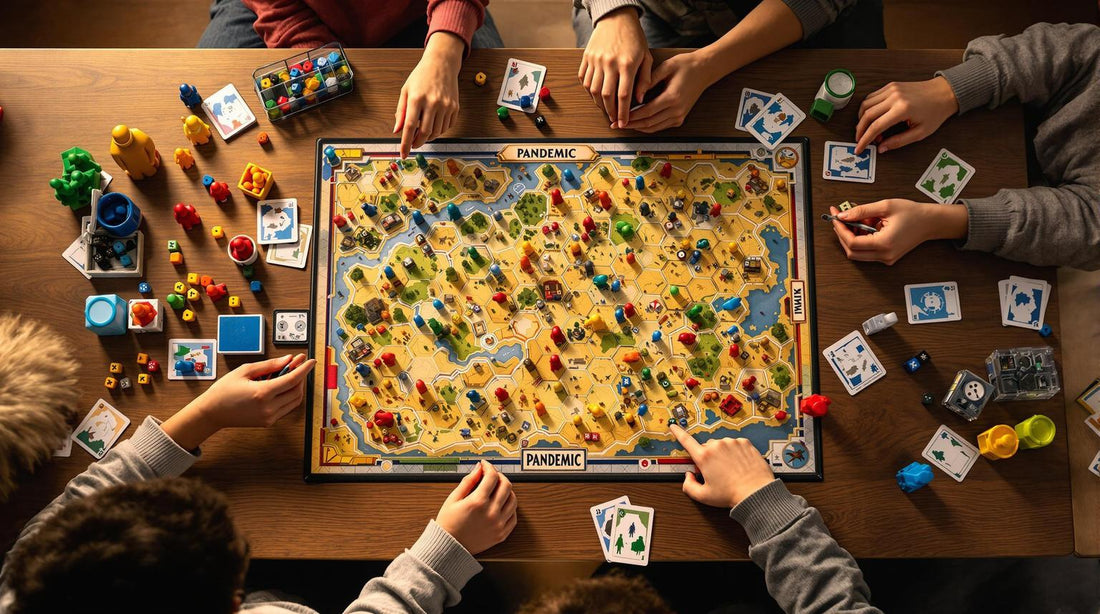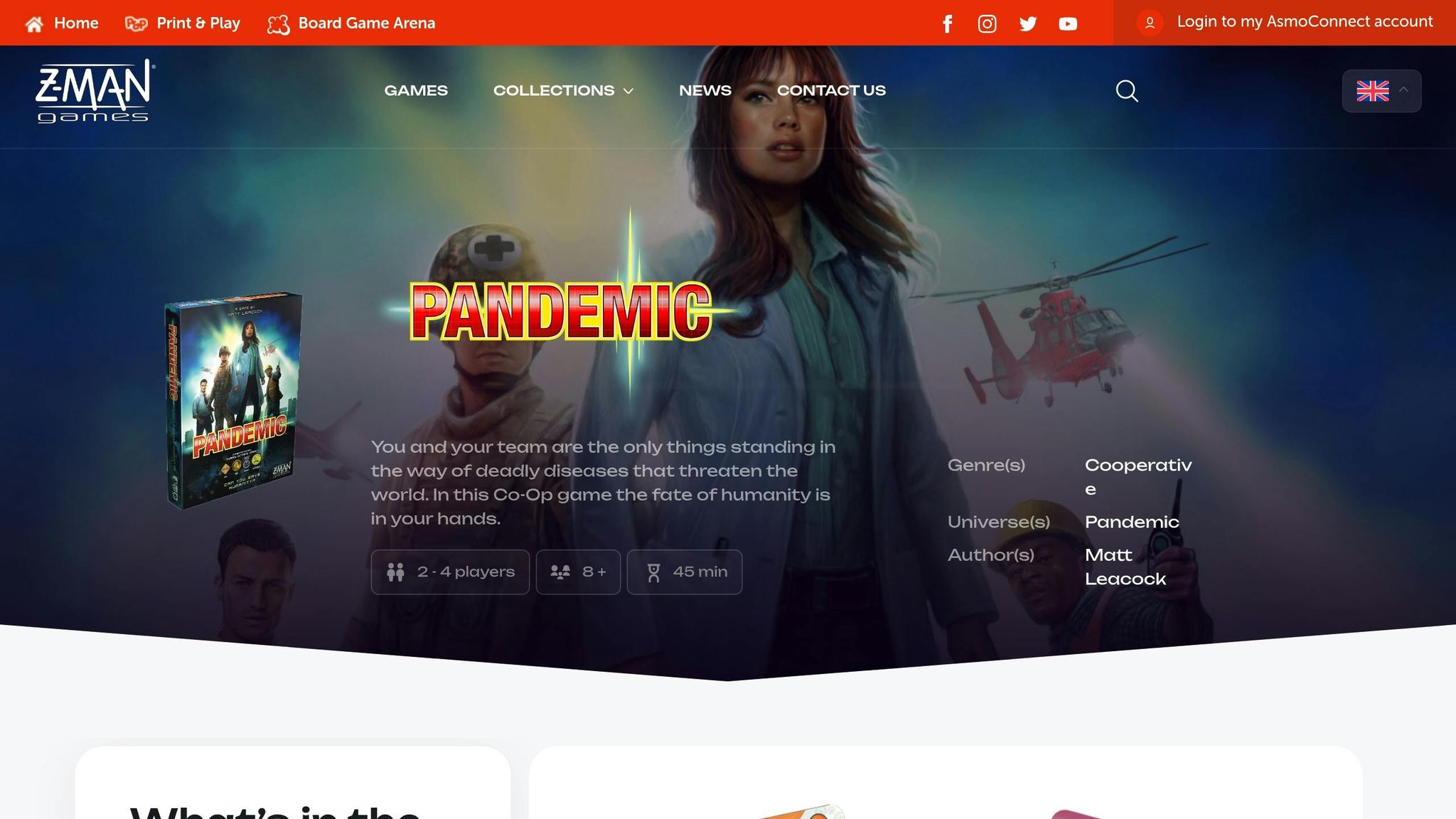Discover the Best Board Games for Every Player

7 Tips for Winning Pandemic
In the cooperative board game Pandemic, teamwork and strategy are the keys to success. Here's a quick breakdown of the most important tips to win:
- Teamwork is Everything: Share your plans, use each role's unique abilities, and think ahead to coordinate effectively.
- Stop Outbreaks First: Prioritize high-risk cities to prevent chain reactions.
- Cure Diseases Quickly: Focus on collecting the cards needed to cure all four diseases.
- Use Actions Wisely: Plan every move carefully, prioritizing urgent threats and efficient travel.
- Save Special Cards: Use event cards strategically during emergencies for maximum impact.
- Prepare for Epidemics: Anticipate reshuffles and position players to respond quickly.
- Stay Flexible: Adapt your strategy as new threats emerge and resources run low.
Quick Overview of Key Strategies
| Tip | Why It Matters | How to Apply |
|---|---|---|
| Team Coordination | Avoid wasted moves and maximize efficiency | Communicate and plan actions together |
| Outbreak Management | Prevents game-ending chain reactions | Treat high-risk cities first |
| Cure Progress | Winning requires curing all diseases | Share cards and prioritize research |
| Action Efficiency | Every turn counts | Focus on urgent tasks and role-specific skills |
| Event Card Timing | Can shift the game in your favor | Save for critical moments |
| Epidemic Readiness | Epidemics reshape the board | Position players and treat hot zones |
| Flexibility | Adapts to unexpected changes | Reassess priorities as the game evolves |
Use these strategies to keep outbreaks under control, cure diseases faster, and work as a team to save the world. Now, let’s dive deeper into each tip!
Pandemic Board Game Strategy Guide

1. Work Together as a Team
Teamwork plays a crucial role in Pandemic, as every decision affects the entire group. Here’s how to keep your coordination on point:
Talk Through Each Turn
Before making any moves, share your cards and planned actions with the team. This helps avoid wasting valuable actions. For instance, if you have city cards that could help build a research station, let your teammates know so they can assist.
Make the Most of Each Role
Each character brings a unique ability to the table. Use these skills wisely to maximize efficiency:
| Role | Main Responsibility | Additional Task |
|---|---|---|
| Medic | Treat diseases | Assist with cures |
| Scientist | Develop cures | Share knowledge |
| Operations Expert | Build research stations | Facilitate movement |
| Dispatcher | Move teammates | Coordinate actions |
Think Several Turns Ahead
Don’t just focus on the current turn - plan for the next few moves. Coordinate card exchanges and pick research station spots that will be useful for handling future outbreaks.
Be Smart About Sharing Cards
The "Share Knowledge" action is powerful but limited. Meet in the right cities to exchange cards while also tackling other tasks like treating diseases or setting up research stations.
2. Stop Outbreaks First
Preventing outbreaks from snowballing is key since they can escalate rapidly. Staying ahead of them is a critical part of any successful plan.
Focus on high-risk cities and prioritize treating areas with severe infections. Leverage role-specific abilities, such as the Medic's skill to remove multiple cubes in one turn, to keep the situation under control.
3. Find Disease Cures Fast
After containing outbreaks, shift your attention to curing diseases. To win, all four diseases must be cured. Work closely with your teammates to collect and exchange cards efficiently, so you can assemble the sets needed for cures as quickly as possible. Teamwork and strategy are key here!
sbb-itb-1ed942f
4. Use Your 4 Actions Well
In Pandemic, every turn gives you 4 actions. How you use them can make or break your strategy, especially when working as a team.
Start by focusing on the most urgent threats. If a city has 3 disease cubes and is on the brink of an outbreak, handle it immediately. Avoid spending actions on less critical tasks when a crisis is looming.
Plan your movement carefully. Use direct or charter flights and take advantage of the Operations Expert's ability to build research stations. These stations not only save you actions but also create efficient travel routes for the entire team. The Operations Expert is key to setting up these networks quickly.
When it comes to treating diseases, the Medic can clear an entire city in one action, making them incredibly efficient. Other roles should treat diseases only when:
- Preventing an outbreak.
- Completely clearing a city to stop reinfection.
- Supporting the team’s progress toward eradication.
Here’s a quick guide to prioritizing your actions:
| Priority | When to Use It |
|---|---|
| Move to Threat | Cities at risk of an outbreak. |
| Treat Disease | Cities with 3 cubes or outbreak risks. |
| Share Cards | When near teammates with needed cards. |
| Build Station | To create a key travel hub. |
Team coordination is crucial. If another player is better positioned to handle a nearby issue, let them take care of it. Focus your actions on tasks where your role’s abilities will have the biggest impact. For instance, the Scientist should prioritize sharing cards, as they need fewer cards to discover cures.
Lastly, avoid wasting actions on unnecessary moves. Walking to an adjacent city that isn’t an immediate threat is often a missed opportunity to do something more impactful. Use every action wisely, and you’ll stay ahead of the game.
5. Save Special Cards
Timing is everything when it comes to using event cards. These cards can be played at any time - even during another player's turn - making them a powerful tool if used wisely.
Here are some key event cards and when to use them:
| Card Name | Best Time to Use |
|---|---|
| Resilient Population | When a high-risk city shows up in the infection discard pile. |
| Government Grant | After identifying key cities for connecting regions or managing outbreaks. |
| Forecast | Right before an epidemic card is likely to appear. |
| Airlift | In emergencies where immediate player movement is critical. |
| One Quiet Night | When multiple outbreaks are about to chain together. |
For Resilient Population, use it to permanently remove a city that's causing repeated issues. With Government Grant, work with your team to place research stations in cities that connect regions, help manage outbreaks, or make collecting cures easier.
Forecast is especially helpful when the infection rate increases or when you need to plan for multiple threats. If you're playing as the Contingency Planner, take advantage of their ability to store an event card outside their hand. This gives your team an extra layer of flexibility when things get tight.
Event cards can be played in response to infections or epidemics, so don't rush to use them too early. A well-timed card can completely shift the game's momentum in your favor.
Finally, coordinate with your team's roles for the best results. For instance, the Dispatcher can pair Airlift with their ability to move players, creating rapid responses to threats. Meanwhile, the Operations Expert can use Government Grant to build a network of research stations that simplifies travel and cure collection.
6. Prepare for Epidemics
Epidemics can throw your entire strategy off course if you're not ready. By staying alert and planning ahead, you can reduce their impact.
Here are some tips to help you stay in control:
-
Keep an Eye on the Infection Deck
Pay attention to the infection deck to predict when an epidemic might hit. Use this knowledge to adjust your priorities and plan your next moves. -
Focus on Hot Zones
Treat cities with high infection levels first to avoid chain reactions, especially after reshuffles. Building research stations can also give you more flexibility to move around. -
Position Wisely During Epidemics
Spread players across different regions so you can respond quickly to new outbreaks. Save event cards for emergencies, and use research stations to create strategic safety nets.
Epidemics follow a pattern: infection rates increase, outbreaks occur, and then the deck reshuffles - often reigniting trouble spots. Setting up safe zones and staying proactive can help you handle these challenges more effectively.
7. Change Plans When Needed
In Pandemic, staying flexible is crucial as threats can escalate quickly. Adjusting your strategy helps you tackle crises and keep outbreaks under control.
Look out for signs that it's time to shift gears, such as:
- Multiple outbreaks occurring in a single region
- Running low on critical disease cubes
- The player deck nearing depletion
- City cards being unevenly distributed among players
Tactical Adjustments to Consider
- Share Resources Effectively: Pass city cards from players far from outbreaks to those who can act immediately.
- Reprioritize Cures: Focus on curing diseases that pose the most immediate outbreak risk.
- Relocate Research Stations: Move stations to areas that align with the current threat landscape.
Clear communication with your team is essential when implementing these changes.
Weighing Risks vs. Rewards
When deciding on a new course of action, evaluate the trade-offs carefully:
| Factor | Key Question |
|---|---|
| Immediate Impact | Will this prevent a loss? |
| Long-Term Effect | How will it influence cure progress? |
| Resource Cost | What resources are being used or sacrificed? |
| Team Position | Can everyone contribute effectively? |
Conclusion
In Pandemic, every decision matters when it comes to saving humanity. Success relies on strategic thinking, teamwork, and efficient use of resources. These tips offer a clear path to mastering the game.
Here’s a breakdown of the key factors that can shape your gameplay:
| Factor | How It Helps | How to Apply It |
|---|---|---|
| Team Coordination | Avoids wasted moves and resources | Communicate regularly and make decisions together |
| Priority Management | Keeps disease spread under control | Tackle immediate threats before focusing on cures |
| Resource Efficiency | Makes the most of limited actions | Use special cards and research stations wisely |
| Flexibility | Handles unexpected changes effectively | Stay ready to adjust to new threats as they arise |
Every role contributes to the team’s success, whether it's containing outbreaks across continents or racing to develop cures. As you refine your approach, prioritize clear communication and collaboration with your team.
Put these strategies into action, and you’ll see your team turn tough situations into consistent victories.






